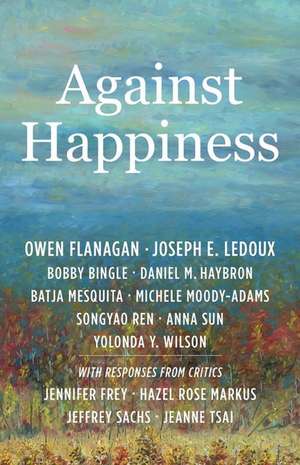Against Happiness
Autor Owen Flanagan, Joseph E. Ledoux, Bobby Bingle, Daniel M. Haybron, Batja Mesquitaen Limba Engleză Paperback – 8 mai 2023
| Toate formatele și edițiile | Preț | Express |
|---|---|---|
| Paperback (1) | 188.21 lei 22-36 zile | +18.93 lei 6-12 zile |
| Columbia University Press – 8 mai 2023 | 188.21 lei 22-36 zile | +18.93 lei 6-12 zile |
| Hardback (1) | 705.54 lei 43-57 zile | |
| Columbia University Press – 8 mai 2023 | 705.54 lei 43-57 zile |
Preț: 188.21 lei
Nou
Puncte Express: 282
Preț estimativ în valută:
36.02€ • 37.38$ • 30.10£
36.02€ • 37.38$ • 30.10£
Carte disponibilă
Livrare economică 24 februarie-10 martie
Livrare express 08-14 februarie pentru 28.92 lei
Preluare comenzi: 021 569.72.76
Specificații
ISBN-13: 9780231209496
ISBN-10: 0231209495
Pagini: 336
Dimensiuni: 140 x 216 x 19 mm
Greutate: 0.43 kg
Editura: Columbia University Press
ISBN-10: 0231209495
Pagini: 336
Dimensiuni: 140 x 216 x 19 mm
Greutate: 0.43 kg
Editura: Columbia University Press
Cuprins
Preface
Introduction
Part I: Happiness Philosophy and Happiness Science
1. Introduction: The Happiness Agenda
2. Varieties of Theories and Measures of Well-Being and Happiness
3. How Should We Think About the Emotion of Happiness Scientifically? Lessons from the Science of Fear
4. Why Averaging Happiness Scores and Comparing Them Is a Terrible Idea
Part II: Culture and Happiness
5. Positive and Negative Emotions: Culture, Content, and Context
6. Happiness and Well-Being as Cultural Projects: Immigration, Biculturalism, Cultural Belonging
7. Happiness and Well-Being in Contemporary China
Part III: Race, Racism, Resignation
8. Happiness, Race, and Hermeneutical Justice: The Case of African American Mental Health
9. Interpreting Self-Reports of Well-Being
Part IV: Conclusions
10. Recommendations for Policy Use of Happiness Metrics
11. Universal Rights, Sustainable Development, and Happiness: Two out of Three Ain¿t Bad
Part V: Responses by Four Critics
12. On Ersatz Happiness, by Jennifer A. Frey
13. Why the Analysis and Assessment of Happiness Matters, by Hazel Rose Markus
14. Three out of Three Is Better, by Jeffrey D. Sachs
15. What the Gallup World Poll Could Do to Deepen Our Understanding of Happiness in Different Cultures, by Jeanne L. Tsai
Notes
References
Index
Introduction
Part I: Happiness Philosophy and Happiness Science
1. Introduction: The Happiness Agenda
2. Varieties of Theories and Measures of Well-Being and Happiness
3. How Should We Think About the Emotion of Happiness Scientifically? Lessons from the Science of Fear
4. Why Averaging Happiness Scores and Comparing Them Is a Terrible Idea
Part II: Culture and Happiness
5. Positive and Negative Emotions: Culture, Content, and Context
6. Happiness and Well-Being as Cultural Projects: Immigration, Biculturalism, Cultural Belonging
7. Happiness and Well-Being in Contemporary China
Part III: Race, Racism, Resignation
8. Happiness, Race, and Hermeneutical Justice: The Case of African American Mental Health
9. Interpreting Self-Reports of Well-Being
Part IV: Conclusions
10. Recommendations for Policy Use of Happiness Metrics
11. Universal Rights, Sustainable Development, and Happiness: Two out of Three Ain¿t Bad
Part V: Responses by Four Critics
12. On Ersatz Happiness, by Jennifer A. Frey
13. Why the Analysis and Assessment of Happiness Matters, by Hazel Rose Markus
14. Three out of Three Is Better, by Jeffrey D. Sachs
15. What the Gallup World Poll Could Do to Deepen Our Understanding of Happiness in Different Cultures, by Jeanne L. Tsai
Notes
References
Index
Notă biografică
Owen Flanagan, Joseph E. LeDoux, Bobby Bingle, Daniel M. Haybron, Batja Mesquita, Michele Moody-Adams, Songyao Ren, Anna Sun, and Yolonda Y. Wilson. With responses from critics Jennifer A. Frey, Hazel Rose Markus, Jeffrey D. Sachs, and Jeanne L. Tsai.
